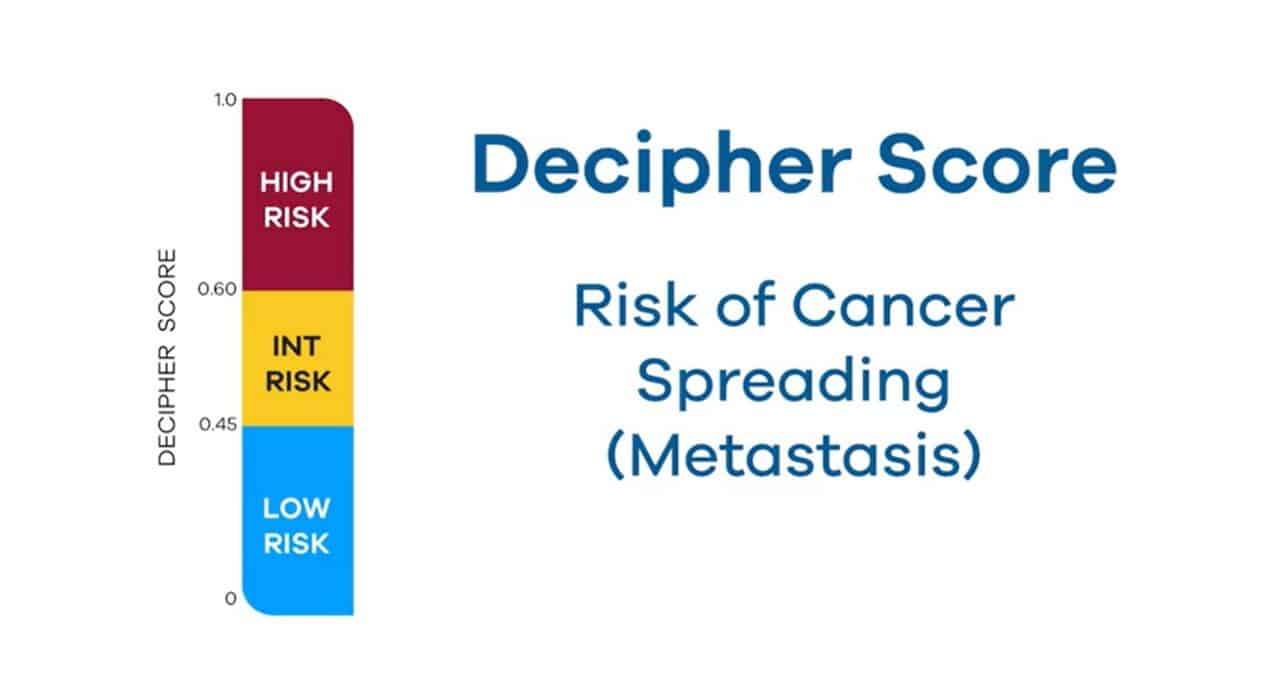What is a decipher prostate RP?
The Decipher® Radical Prostatectomy (RP) test provides an analysis of a patient’s individual tumor aggressiveness and prostate cancer-specific mortality risk after radical prostatectomy.
The Decipher RP is a tissue-based prostate cancer marker test for high-risk patients, which includes those with:
- positive surgical margins
- extraprostatic extension
- bladder neck invasion
- PSA rise after surgery
The test uses advanced whole genome technology.
Decipher RP Video
Learn more about how insights provided by the Decipher RP test can help you decide your next move.
Understanding Your Decipher RP Test Results
Decipher Radical Prostatectomy (RP) is a tissue based prostate cancer marker (PCM) than can be effective in helping a high-risk patient and their healthcare provider determine if additional treatment following radical prostatectomy could be effective. See a sample Decipher RP results report and learn more about how to interpret these results. Results from the Decipher RP test should first be discussed with a healthcare provider.
Decipher RP FAQs
Below is an initial list of frequently asked questions about the Decipher Radical Prostatectomy.
Prostate cancer biomarkers (PCMs) are molecules found in blood, tissue, or body fluids. PCMs are revolutionary new, non-invasive diagnostic tests that may help your healthcare provider decide if your prostate cancer is in fact low risk, if something more aggressive may be lurking in your prostate, or if there are hot spots in the prostate that may need to be re-evaluated upon biopsy. PCMs also can help you and your healthcare provider determine the most appropriate treatment for your cancer.
There are many factors that will make one prostate cancer marker test better suited for individual cases. Many times, individuals who have never had a biopsy or had low to intermediate grade prostate cancer (Gleason 3+3=6 or 3+4=7) diagnosed on a biopsy are well suited for blood or urine prostate cancer markers, whereas individuals who have persistently negative biopsies or a biopsy of intermediate to high grade cancer may benefit from tissue prostate cancer markers. Use this interactive questionnaire to see what tests may be right for you. Once you’ve completed the questionnaire, discuss the results with your healthcare provider. Also be sure to check out our Patient Journey section that may help you decide which test is right for you.
If you have had a prostatectomy and are at risk of your cancer spreading or recurring, the following PCMs could be helpful:
If your physician has recommended radiation to treat your prostate cancer, the following tests can help inform your treatment plan. Or, if you have had radiation and underwent another biopsy, these tissue-based tests could help you and your healthcare provider assess whether you may need additional treatment down the line. However, many radiation oncologists may want to wait until your PSA rises +2ng/ml above the lowest point after your radiation to see if further biopsies or treatment are necessary.
The Decipher Radical Prostatectomy (RP) test is a tissue-based prostate cancer marker (PCM) that helps high-risk patients and their healthcare providers understand if they may need additional treatment following radical prostatectomy.
The Decipher RP test analyzes 22 RNA biomarkers associated with metastatic progression including: cell cycle progression, immune system activity/response, androgen signaling, metabolism and cancer blood vessel formation potential. In general, results of the Decipher RP test are presented as follows:
- Low risk: 0-.45
- Average risk: .45-.60
- High risk: .60-1.0
The test also reports on the following for each risk category:
- Risk of metastasis within 5 years (0- 100%)
- Risk of prostate cancer death within 10 years (0-100%)
See a sample Decipher RP result report and learn more about interpreting these results. Patients should always discuss the results of their test with their physician.
Learn More
Explore more information about Decipher RP.


